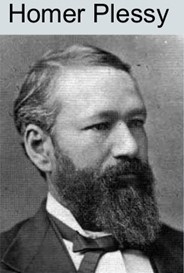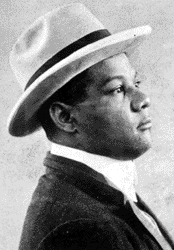
Historical and Cultural Convergences 2

Homer Plessy
In 1892, a Creole man of color, Adolph Homer Plessey, set out to test the new law requiring separate cars for Black and White passengers, and boarding an excursion train, insisted on sitting in the whites-only section. In 1896, in Plessy vs. Ferguson , the Supreme Court of the United States upheld his conviction. Separate but equal, it said, was constitutional. That decision would govern life in the United States South and New Orleans for nearly sixty years. (Burns 2001)

Creole jazz musician Sidney Bechet
Furthermore, in the racial aggression of voter suppression, the Louisiana state legislature went on to pass a law barring all would-be voters whose grandfathers had been slaves. Even though ninety-five percent of the city's Black men were registered to vote, only one percent were eligible to go to the polls.
Creole people of color were now grouped with Black people and deemed as second-class citizens. But, now forced to work and play in Black communities, their technique fluency forever changed music. Brandon Marsalis says, "Creole musicians merged their classical virtuosity with the blues and sacred music of the Black bands." (Burns 2001)
Portia Maultsby and Melonee Burnim confirm Marsalis's statement: "The emergence of jazz has often been explained as the meeting of the uptown African American brass and string band tradition of blues-drenched, aurally transmitted music, with the downtown Creole band tradition of instrumental virtuosity, musical literacy, and training in classical music (Maultsby and Burnim 2015, 165)." Nonetheless, writings and anecdotal information of such significant figures as Sidney Bechet ,Albert Nicholas, Wingy Manone, Leon Roppolo, Louis Armstrong, and Warren "Baby" Dodds suggest that young musicians influenced the development of jazz more than the politics of race.
Louis Armstrong
Very few of the men whose names have become great in the early pioneering of jazz and of swing were trained in music at all. They were born musicians: they felt their music and played by ear and memory. That was the way it was with the great Dixieland Five.
Heebie Jeebies
Say, I've got the Heebies
I mean the Jeebies
Talking about
The dance, the Heebie Jeebies
Do, because they're boys
Because it pleases me to be joy





